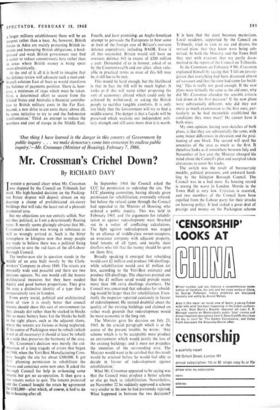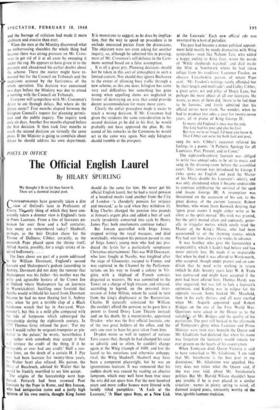'One thing 1 have learned is the danger in this
country of Government by public inquiry . . . we make democracy come into contempt by endless public inquiry.'—Mr. Crossman (Minister of Housing), February 7, 1966.
Mr. Crossman's Crichel Down?
By RICHARD DAVY
IRAISED a personal cheer when Mr. Crossman was slapped by the Council on Tribunals last week. His high-handed decision on the Packing- ton Estate dispute will deposit almost on my doorstep a clump of prefabricated six-storey buildings that will take the heart out of a pleasant residential area.
But my objections are not entirely selfish. Nor are they political, as I am a determinedly floating voter. It merely seems glaringly obvious that Mr. Crossman's decision was wrong in substance as well as wrongly arrived at. Such is the bitter atmosphere in Islington now that many people are ready to believe there was a political fixing operation to save the red faces of the all-Labour Borough Council.
The twelve-acre site in question stands in the middle of an area built mostly by the Cloth- workers' Company in about 1840. The streets are unusually wide and peaceful and there are two spacious squares. No one would call the houses architectural treasures but they have modest dignity and good human proportions. They give the area a distinctive identity of a type that is comparatively rare in London.
From every social, political and architectural point of view it is surely better that council tenants should share this sort of environment (as they already do) rather than be stacked in blocks like so many battery hens. Let the blocks be built in the right places, such as the adjacent slums, where the tenants are furious at being neglected. If the centre of Packington must be rebuilt (which Is not at all necessary) it should at least be rebuilt in a style that preserves the harmony of the area.
Mr. Crossman's decision was merely the cul- mination of a long tragedy of errors that began in 1960, when the Yeti-Best Manufacturing Corn- Pany bought the site for about £300,000. It got f.CC planning permission to rehabilitate the houses and construct some new ones. It asked the Borough Council for help in re-housing some tenants but got no co-operation. It then gave a few tenants notice to quit. The tenants protested and the Council bought the estate by agreement. for f582,000—after which, of course, it had to do the re-housing after all.
In September 1964 the Council asked the LCC for permission to redevelop the site. The LCC planning committee, having already given permission for rehabilitation, eventually refused. but before the refusal came through the Council had appealed to the Minister of Housing, who ordered a public inquiry. This was held in February 1965, and the arguments for rehabili- tation as against redevelopment were thrashed out in a welter of conflicting calculations. The fight against redevelopment was waged by an alliance of middle-class owner-occupiers, an assurance company with adjacent property, local tenants of all types, and nearby slum dwellers who felt that the money should be spent on them first.
Broadly speaking it emerged that rebuilding would cost £2 million and produce 540 dwellings, while rehabilitation would cost £1 million (or less, according to the Veri-Best estimate) and produce 420 dwellings. The objectors pointed out that the £1 million saved would provide many more than 100 extra dwellings elsewhere. The Council was concerned that subsidies for rebuild- ing would be larger than for rehabilitation. Even- tually the inspector reported cautiously in favour of redevelopment. He seemed doubtful about the quality of the existing buildings and claimed on rather weak grounds that redevelopment would be more economic in the long run.
The Minister gave his decision on July 23, 1965. In the crucial paragraph which is at the centre of the present trouble, he wrote: 'Any scheme which is to be acceptable must produce an environment which would justify the loss of the existing buildings; and it must not prejudice the amenities of the surrounding area. The Minister wouldwant to be satisfied that this result would be attained before he would feel able to decide in favour of redevelopment against rehabilitation.'
What Mr. Crossman appeared to be saying was that the Council must produce a better scheme or else go back to rehabilitation. Nevertheless, on November 22 he suddenly approved a scheme very similar to the one he had previously rejected. What happened in between the two decisions? It is here that the story becomes mysterious. Local residents, supported by the Council on Tribunals, tried in vain to see and discuss the revised plans that they knew were being sub- mitted. At both the Ministry and the Town Hall they met with evasions that are partly docu- mented in the report of the Council on Tribunals.
In the Commons on February 9 Mr. Crossman explained himself by saying that 'I felt on investi- gation that everything had been discussed almost ad nauseam and that the time had come for build- ing.' This is really not good enough. If the new plans were virtually the same as the old ones, why did Mr. Crossman abandon the sensible criteria laid down in his first decision? If the new plans were substantially different, why did they not merit as much examination as the first ones, par- ticularly as he had meanwhile established the conditions they must meet? He cannot have it both ways.
My own opinion, having seen sketches of both plans, is that they are substantially the same, with some minor differences in elevation and the posi- tioning of one block. The second will spoil the amenities of the area as much as the first. If therefore looks as if somewhere between July and November of last year the Minister changed his mind about the Council's plan and accepted token alterations to cover his tracks.
The switch was the result of bureaucratic muddle, political pressures, and awkward hand- ling by the Islington Borough Council. The Council was in a bad mess. Its housing record is among the worst in London. Morale in the Town Hall is very low. Criticism is resented, and two members of the Council have been expelled from the Labour party for their attacks on housing policy. It had staked a great deal of prestige and money on the Packington scheme
and the barrage of criticism had made it more stubborn and evasive than ever.
When the men at the Ministry discovered what an embarrassing shambles the whole thing had become there was strong pressure on Mr. Cross- man to get rid of it at all costs by sweeping it under the rug. He appears to have given in to the pressure and abandoned his earlier doubts about the scheme. There the matter might have re- mained but for the Council on Tribunals and the suspicions aroused by the furtiveness of the whole operation. The decision was announced two days before the Ministry was due to attend a meeting with the.Council on Tribunals.
Everyone will sympathise with Mr. Crossman's desire to cut through delays. But where do the delays occur? Five months elapsed between the Islington Council's request for planning permis- sion and the public inquiry. The inquiry took only six days. Another five months elapsed before the first decision. It then took four months to reach the second decision on virtually the same plans. If the Minister is going to complain about delays he should address his own department.
It is monstrous to suggest, as he does by implica- tion, that the way to speed up procedure is to exclude interested parties from the discussions. The objectors were not even asking for another inquiry, so, although he admitted this in passing, most of Mr. Crossman's self-defence in the Com- mons seemed based on a false assumption.
It is all a great pity. Planning decisions should not be taken in this sort of atmosphere in such a limited context. Nor should they ignore Buchanan to the extent of allowing busy traffic through a new scheme, as this one does. Islington has some very real difficulties but something has gone wrong when appalling slums are neglected in favour of destroying an area that could provide decent accommodation for many more years.
Clearly the unfair procedure made it easier to reach a wrong decision. If Mr. Crossman had given the residents the same consideration in his second decision is he did in his first, he would probably not have approved the plan. By the sound of his remarks in the Commons be would act in the same way again. Not only Islington should tremble at the prospect.































 Previous page
Previous page